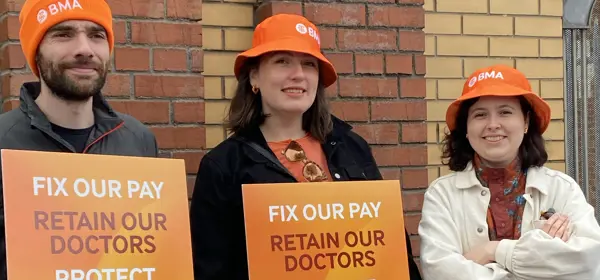GPs plan to withdraw services
GPs plan to withdraw services
Following vote to take collective action owing to contract imposition, doctors set out next steps
GPs in Northern Ireland are to stop providing some services after voting overwhelmingly to take collective action in their fight to win increased funding for general practice.
Almost all GP partners (98.7 per cent) who took part in a referendum voted yes to taking collective action after the health minister announced the general medical services contract would be imposed on GPs.
The vote – which attracted a high turnout of almost 80 per cent – means GPs will withdraw some non-funded services (that don’t form part of the GMS contract).
This could include limiting daily patient consultations in line with BMA safe-working guidance, serving notice on voluntary activity, such as complex wound and ulcer dressings, and ceasing completion of unfunded paperwork, such as dealing with patient eligibility for NHS services. (More details here)
BMA Northern Ireland GPs committee chair Frances O’Hagan (pictured above) said the result sent a clear and unequivocal message to health minister Mike Nesbitt.
‘This is the first time the GMS contract has been imposed on the GP workforce in Northern Ireland, therefore, it should come as no surprise that GP partners have voted overwhelmingly in favour of taking the unprecedented step of collective action to force improvements to the 2025/26 contract offer and save general practice from all-out collapse,’ she said.
‘We have been warning for well over a decade now that general practice was not being funded to meet the needs of growing patient lists and that failure to act on this would have consequences on patient care.’
Warnings had fallen ‘on deaf ears’, she added. ‘Instead, the current health minister, who wants to shift healthcare services “left” into the community where general practice sits at the core, hopes to achieve this by imposing an under-funded contract and publicly dismissing GPs’ valid concerns on how this will impact patients in these very same communities. It is demoralising and has left GPs with no choice but to vote in favour of collective action.’
Less than 1p
Dr O’Hagan said the referendum period saw a massive increase BMA membership among GPs in Northern Ireland owing to the strength of feeling against the contract imposition.
She stressed the imposed contract would serve to work against improving patient access. ‘We asked the department for an additional £39 per patient, per year. Instead, in this imposed contract for 2025/26, they have only given us an additional 50p per patient, per year. That is less than a penny per patient, per week to improve access. This is how much they value the service GPs provide and how much they value the care of our patients. It’s simply not enough.
‘It will not stem the tide of contract hand-backs and the domino closure effect on nearby practices in communities throughout Northern Ireland. At the heart of all this, it works against improving access for our patients.’
Dr O’Hagan called on the minister to act urgently and resume contract negotiations. ‘Not one GP who voted in favour of collective action wants to have to go down this road, but they feel they have been left with no choice,’ she said.
‘The minister needs to demonstrate that he values general practice and that he has our backs by coming back to the negotiating table with an improved 2025/26 contract offer.’
In May, Mr Nesbitt told the Northern Ireland Assembly the contract offer was ‘at the limit of what I can do’ and there was nothing to be gained from further contract negotiations.
'Under pressure'
A spokesperson for the Northern Ireland Department of Health said: 'It will be important that GPs continue to adhere to the terms of their contract while taking any action, that there is no negative impact on patient safety and that access to service are maintained.
'The department recognises that primary care system is under considerable, sustained pressure and GPs and their teams are working hard but are struggling to meet the demand from patients.
'The financial challenges facing the Department of Health are well-known. In that context, the £9.5m in additional funding included in the 2025/26 GMS contract represented the best possible offer the department could make for 2025/26.
'It is a matter of regret that the department has not been able to reach agreement in relation to the 2025/26 GMS contract.'



